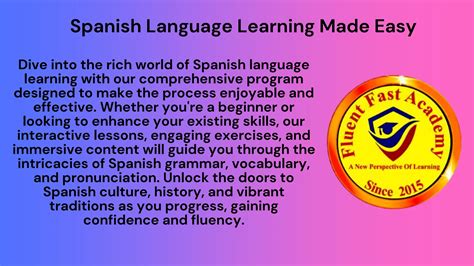Introduction

Spanish, the second most spoken language globally, has captivated the hearts and minds of language enthusiasts for centuries. Its vibrant culture, rich history, and widespread use make it an invaluable asset for personal growth, career advancement, and global connection.
Why Learn Spanish?
-
Global Reach: With over 500 million native speakers across 20 countries, Spanish is one of the most widely spoken languages on the planet. Mastering it unlocks access to vast cultural experiences, international travel, and business opportunities.
-
Economic Advantages: Spanish-speaking countries represent a significant portion of the global economy. Proficiency in Spanish can enhance career prospects, expand job opportunities, and boost earning potential in fields such as business, healthcare, and tourism.
-
Cognitive Benefits: Learning a foreign language has been shown to improve cognitive abilities, such as memory, attention span, and problem-solving skills. It also delays the onset of age-related cognitive decline.
-
Cultural Immersion: Spanish is a gateway to countless cultural treasures, including literature, music, art, and cuisine. By immersing yourself in the language, you gain a deeper appreciation for the cultures of Spain, Latin America, and beyond.
Overcoming the Challenges
While learning Spanish can be a rewarding experience, it can also present certain challenges:
-
Verb Conjugations: Spanish verbs have a complex system of conjugations, which can be daunting for beginners. However, with consistent practice, these conjugations become more manageable.
-
Pronunciation: Spanish pronunciation can differ significantly from English, particularly in the use of rolled “r” sounds and guttural “h” sounds. Dedicated effort and listening to native speakers can help overcome these challenges.
-
False Cognates: Spanish and English share many words that have similar spellings but different meanings, known as false cognates. These can lead to misunderstandings if not carefully considered.
Tips for Success
-
Set Realistic Goals: Divide your learning into manageable chunks and set realistic goals for yourself. This will prevent discouragement and maintain motivation.
-
Immerse Yourself: Surround yourself with Spanish by listening to music, watching movies, reading books, and engaging in conversations. This exposure helps you absorb the language naturally.
-
Consistent Practice: The key to mastering Spanish is consistent practice. Dedicate a set amount of time each day to studying, whether it’s reviewing vocabulary, practicing grammar, or listening to podcasts.
-
Find Language Partners: Connecting with native Spanish speakers or fellow learners can significantly improve your fluency and confidence. They can provide feedback on pronunciation and offer insights into cultural nuances.
-
Use Technology: There are numerous language learning apps, websites, and online courses that can supplement your formal studies and make learning more engaging.
Applications in Various Fields
-
Business: Proficiency in Spanish opens doors to business opportunities in Latin America and beyond. It facilitates communication with clients, partners, and suppliers, enhancing collaboration and profitability.
-
Healthcare: Spanish-speaking patients represent a growing segment of the population in healthcare settings. Healthcare professionals who speak Spanish can provide culturally competent care, improve communication, and strengthen patient engagement.
-
Education: Spanish is a popular language for instruction in schools and universities. Learning it can enhance educational opportunities, foster cultural diversity, and prepare students for a globalized world.
-
Tourism: Spanish fluency is essential for navigating Spanish-speaking countries as a tourist. It enables effective communication with locals, enriches cultural experiences, and ensures a more authentic travel experience.
Useful Tables
| Resource | Description |
|---|---|
| Duolingo | Free language learning app with bite-sized lessons and gamified elements |
| Babbel | Paid subscription service offering structured courses with interactive exercises |
| FluentU | Language immersion platform that uses authentic videos and interactive subtitles |
| Italki | Marketplace connecting language learners with tutors for personalized lessons |
Effective Strategies
-
Motivation: Identify your reasons for learning Spanish and keep them in mind throughout your journey. This will fuel your motivation and help you overcome challenges.
-
Goal Setting: Establish specific, measurable, achievable, relevant, and time-bound (SMART) goals for your Spanish learning. This will provide a roadmap for your progress.
-
Active Learning: Engage in activities that require you to actively use the language, such as speaking, writing, and listening comprehension. This makes learning more effective than passive activities like reading or listening.
-
Feedback and Correction: Seek feedback from native speakers or language teachers to identify errors and improve your fluency. Embrace corrections as opportunities for growth.
-
Consistency: Make Spanish learning a regular part of your routine. Even short, daily practice sessions can accumulate significant progress over time.
FAQs
-
How long does it take to learn Spanish fluently? The time frame varies depending on individual factors, but with consistent practice, learners can achieve basic fluency within 6-12 months.
-
Is it easier to learn Spanish if I already speak another Romance language? Yes, knowledge of another Romance language (e.g., French, Italian) can facilitate Spanish learning, as they share similarities in grammar and vocabulary.
-
Is Spanish a difficult language to learn? For native English speakers, Spanish is considered to be a moderately difficult language to learn, but it is more accessible than some other major languages like Chinese or Arabic.
-
What is the best way to learn Spanish pronunciation? Listen to native speakers, practice speaking aloud, and record yourself to identify areas for improvement.
-
How can I maintain my Spanish skills over time? Engage in regular use of the language through conversation, reading, and media consumption. Travel to Spanish-speaking countries to immerse yourself in the language.
-
Is learning Spanish worth it? Absolutely! Spanish is a valuable asset for personal and professional growth, connecting you to a vast global community and enriching your life in countless ways.
